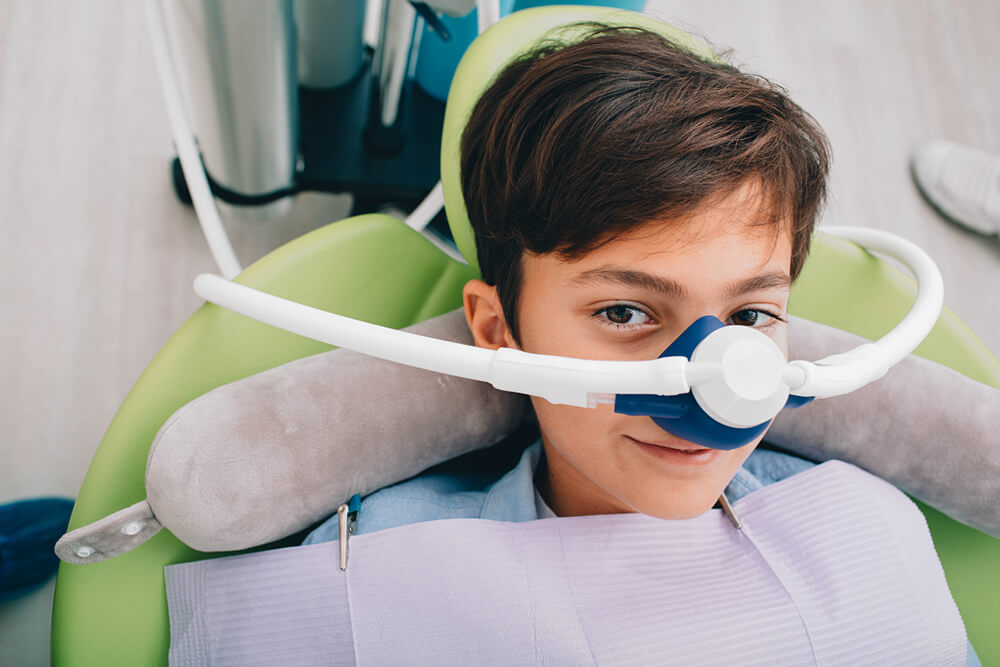Most parents have their child wear a helmet while riding their bike, floaties while learning how to swim, or elbow and knee pads when rollerblading or skateboarding. These are all common examples of wearing safety equipment during certain athletic activities to minimize the risk or severity of sports injuries. When it comes to your child’s oral health, their dentist may also advise that they wear a sports mouthguard to protect their teeth and gums from injury as well.
What is a sports mouthguard?
A sports mouthguard is a specific type of mouthguard that is fabricated to prevent damage to the teeth and gums. While other types of mouthguards fit primarily over the teeth, a sports mouthguard is designed to fit over both the teeth and the gums. Additionally, a sports mouthguard can be single, meaning that it only fits over the upper arch, or double, meaning that it fits over both the top and bottom arches. Although most sports only require a single mouthguard, a double mouthguard may be recommended, especially in cases where your child has braces.

Sports mouthguards are available in three forms: over the counter stock mouthguards, boil and bite, and custom-fabricated by a dentist. Over the counter stock mouthguards come pre-fabricated in a variety of sizes, are inexpensive, and are readily available. However, stock mouthguards rarely fit properly, which makes them uncomfortable and can increase the risk of gum irritation or other problems. They also offer little protection compared to the other two types and are not recommended.
Boil and bite mouthguards are another type of over the counter mouthguard that allows for some customization and a better fit than stock mouthguards. To use a boil and bite mouthguard, you will need to boil the material to soften it, then have your child bite and hold until the material has hardened around the teeth. As it hardens, you can use your fingers to mold the material around the teeth. Although boil and bite mouthguards do offer a better fit than regular stock mouthguards, their fit is partially dependent on how well you or your child can mold the material. This means that they still may not fit properly and may not offer the best protection.
Since both types of over the counter mouthguards do not offer the protection or fit as a custom-fabricated mouthguard, most dentists recommend using a custom mouthguard. To make a custom mouthguard, your child’s dentist will take a dental impression of their teeth and gums, and use this information to have a sports mouthguard fabricated out of a durable plastic. Because of their proper fit and materials used to fabricate them, custom-fitted sports mouthguards offer the best level of protection. Additionally, many team or league insurance policies will only cover the cost of damages if an injury was sustained while wearing a mouthguard fabricated by a dental professional.
Does my child need a sports mouthguard?
The American Dental Association recommends mouthguard use for the following activities:

- Acrobatics
- Baseball
- Basketball
- Bicycling
- Boxing
- Equestrian events
- Extreme sports
- Field Hockey
- Football
- Gymnastics
- Handball
- Ice Hockey
- Inline Skating
- Lacrosse
- Martial Arts
- Racquetball
- Rugby
- Shot Putting
- Skateboarding
- Skiing
- Skydiving
- Soccer
- Softball
- Squash
- Surfing
- Volleyball
- Water Polo
- Weightlifting
- Wrestling
Although a sports mouthguard is recommended for the aforementioned activities, there are some sports that may require the use of a mouthguard in order to participate. Due to team or league insurance policies, there are also cases where a custom-fitted sports mouthguard is required. Generally speaking, high contact sports, for example hockey, football, or boxing, require the use of a sports mouthguard. This is because the National Youth Sports Safety Foundation (NYSSF) notes that children who don’t wear a mouthguard are 60 times more likely to obtain a dental injury.
While there are many different ways your child could injure their teeth and/or gums, the most common dental injuries obtained while playing sports include:
- Cracked Teeth: while helmets protect your child’s head from a blow to face, a mouthguard protects your child’s teeth. Any type of facial impact around the mouth can potentially cause your child’s teeth to fracture or chip, which can cause tooth pain and sensitivity.
- Fractured Tooth Roots: while a cracked tooth generally refers to the crown, or visible portion of the tooth, a fractured tooth root can occur when a fracture spreads to the tooth root or when a hard blow to the jaw is absorbed.
- Tooth Intrusion: while many people may be concerned about teeth being knocked out while playing sports, not as many people know that the teeth can also be driven down into the jawbone. Tooth intrusion is often seen in children with primary teeth and requires immediate treatment to prevent secondary complications.
As you can see, sports mouthguards are an essential piece of safety equipment for your child. Although custom-fitted mouthguards are highly recommended, using an over the counter mouthguard is still better than not having your child wear a mouthguard at all. Having your child wear a mouthguard while playing sports can significantly reduce their risk of sustaining common sports-related dental injuries.






